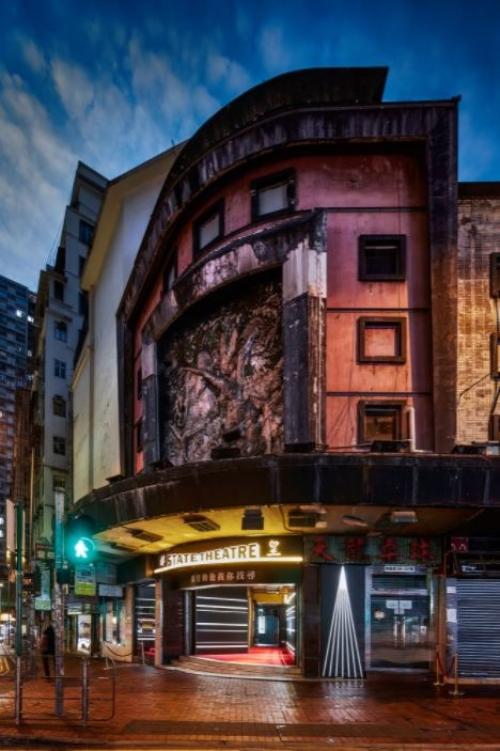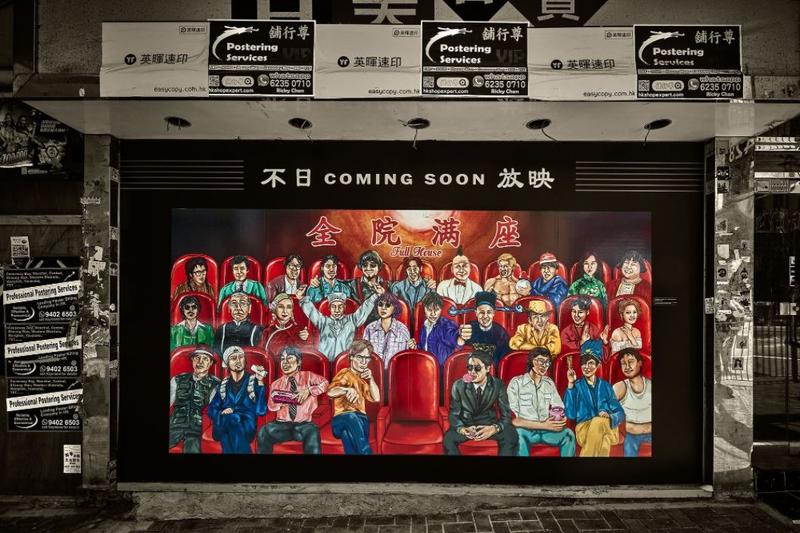 This image grab taken on May 25, 2021 from the website of Culture for Tomorrow (CFT) shows the State Theater in North Point, Hong Kong, during an exhibition on the Hong Kong iconic theater organized by CFT.
This image grab taken on May 25, 2021 from the website of Culture for Tomorrow (CFT) shows the State Theater in North Point, Hong Kong, during an exhibition on the Hong Kong iconic theater organized by CFT.
HONG KONG - A vintage-style ticket, hand-drawn posters of old movies and a neon light model of the parabolic truss. A recent immersive exhibition on Hong Kong's iconic theater brought back May Ma's memories of decades ago.
Ma, 74, had worked as an usher and ticket seller in the State Theater for 19 years since 1978.
The current owner of the State Theater in will begin a conservation project with the goal of restoring it as the landmark for culture and arts by 2026
In the exhibition last month, the original glamor of the theater that closed in 1997 was restored in front of Ma and many other visitors. More than 100 artifacts, including movie handbills and staff uniforms, were on display to show the theater's cultural landscape of the old days.
"It's the golden age for Hong Kong movies," said Ma. "When Bruce Lee's Way of the Dragon was released, the queue (of people waiting to buy a ticket) stretched all the way to the street," Ma said.
Ma recalled that going to the theater or watching movies is the first choice of entertainment for young people at that time and she and her husband once watched five films a day.
 This image grab taken on May 25, 2021 from the website of Culture for Tomorrow (CFT) shows a poster on display at an exhibition on the Hong Kong iconic theater organized by CFT.
This image grab taken on May 25, 2021 from the website of Culture for Tomorrow (CFT) shows a poster on display at an exhibition on the Hong Kong iconic theater organized by CFT.
The theater was founded in 1952 by entrepreneur Harry Oscar Odell under the name of Empire Theater. The name, State Theater, was adopted in 1959 when the theater was sold and reopened. North Point, an area in the northern part of Hong Kong Island where the theater is located, was known for its energetic nightlife, dubbed as "Little Shanghai" in the 1950s.
ALSO READ: Notes on a forgotten era
A symbolic building in Hong Kong, the theater featured performances by international artists and witnessed the booming period of the film industry.
"It was a time of postwar recovery and the State Theater as a performance venue was quite unique under the background," architectural conservationist Wendy Ng said.
In June 1956, an art ensemble from the Chinese mainland arrived in Hong Kong and gave spectacular performances in the theater, marking the first such event after the founding of the People's Republic of China. The performances received enormous popularity in Hong Kong.
"In the history of Hong Kong's performing arts, the State Theater has an irreplaceable position and great cultural value. It had all the makings of a 'cultural landmark' at that time," Ng said.
Its glory faded through time. The building of the theater was gradually turned for other purposes, including a snooker hall and neighborhood shopping center. The theater closed in 1997, two years after a fire accident.
But the iconic theater remains in people's minds.
READ MORE: Breathing new life into old buildings
 This undated photo shows the Empire Theater, which is now known as the State Theater, in Hong Kong. (PHOTO PROVIDED TO CHINA DAILY)
This undated photo shows the Empire Theater, which is now known as the State Theater, in Hong Kong. (PHOTO PROVIDED TO CHINA DAILY)
Ng has many joyful memories in her mother's children's wear store in the shopping center of the theater building when she was a preschooler back in the 1980s. She still kept a ticket for the last film shown in the theater before its closure. "It was Mr. Nice Guy starring Jackie Chan. I watched it with my mother and older brother."
The good news is the theater will hopefully come into life in the future.
The theater structure was listed as a Grade I historic building of Hong Kong in March 2017 and its current owner, Hong Kong-based conglomerate New World Development, will begin a conservation project after the exhibition, with the goal of restoring it as the landmark for culture and arts by 2026.
"Its history may have faded through time, but its story is far from over," Adrian Cheng, chief executive officer of New World Development, said.
Ma has treasured for 24 years a newspaper clipping about the theater's closure and she is eagerly looking forward to the day the theater comes back as beautiful and prosperous as ever. "People in the neighborhood will have a good place," she said.


